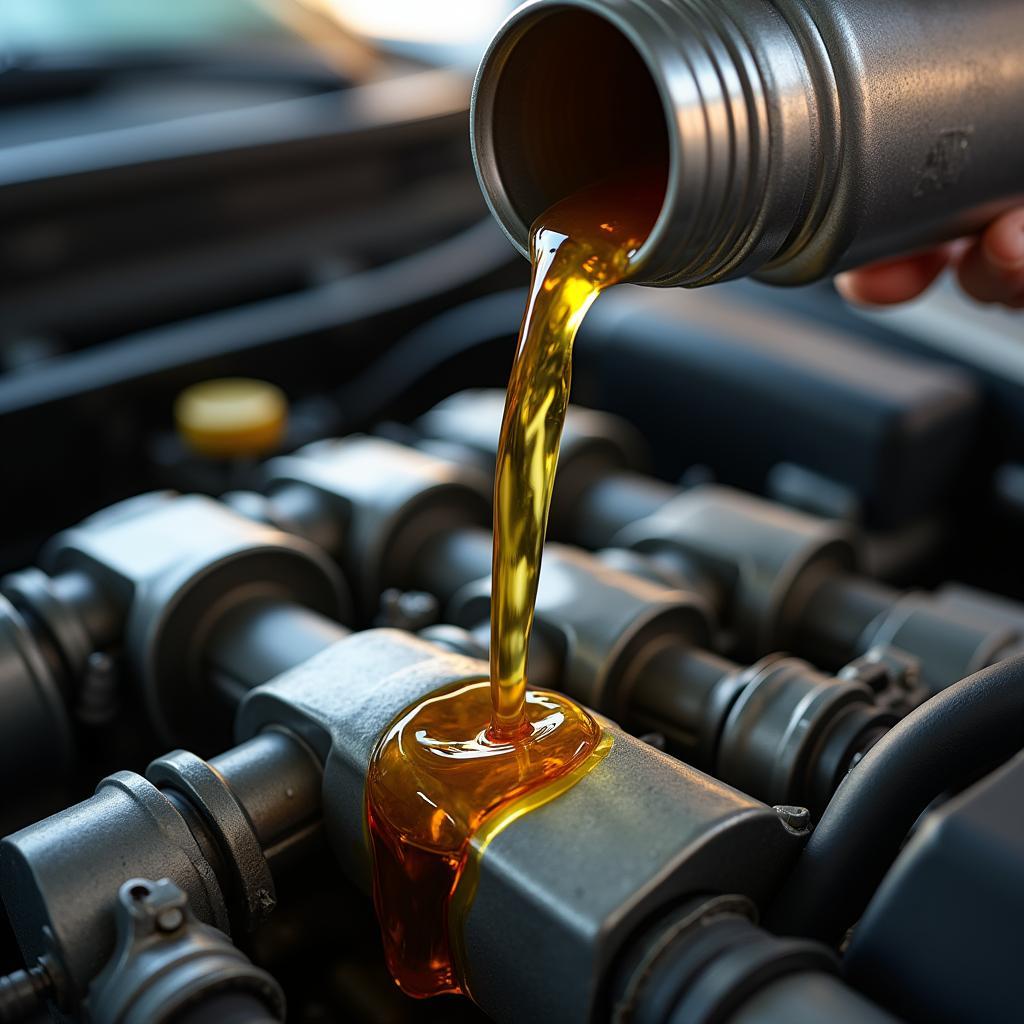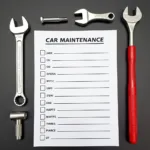Car Engine Oil Change In First Service is a crucial aspect of vehicle maintenance. It ensures the longevity and optimal performance of your engine. This article dives deep into the importance of this first oil change, addressing common questions and misconceptions.
Why is the First Oil Change So Important?
The first oil change is arguably the most important one in your car’s lifespan. During the initial break-in period, tiny metal particles from the engine’s moving parts can contaminate the oil. These particles, a byproduct of the manufacturing process and the engine “settling in,” can cause excessive wear and tear if not removed. A timely oil change flushes out these contaminants, protecting your engine from premature damage. Furthermore, fresh oil ensures proper lubrication, reducing friction and improving fuel efficiency.
Changing the oil also allows mechanics to inspect the engine for any potential issues early on. This proactive approach can save you money and headaches down the road. Don’t underestimate the power of this first service – it’s a small investment that yields significant long-term benefits.
Debunking the Myths Surrounding First Oil Changes
There’s a lot of misinformation circulating about first oil changes. Some believe it’s unnecessary, while others think it should be done much earlier than recommended. Let’s address some common myths:
- Myth 1: Modern engines don’t require a first oil change. This is false. Even with advancements in engine technology, microscopic metal particles are still produced during the break-in period.
- Myth 2: The first oil change should be done at 1,000 miles. While this was true for older vehicles, modern cars often have different recommendations. Always consult your owner’s manual for the specific interval recommended by the manufacturer.
- Myth 3: Any oil is fine for the first change. Using the correct oil viscosity and type, as specified in your owner’s manual, is crucial for optimal engine performance and protection.
What Happens During a First Car Service Oil Change?
The first service oil change is more than just draining and refilling the oil. A comprehensive service typically includes:
- Oil and filter replacement: The old oil is drained, and a new oil filter is installed.
- Fluid top-off: Other essential fluids, like coolant and brake fluid, are checked and topped off if necessary.
- Visual inspection: Mechanics inspect the engine for leaks, wear, and other potential problems.
- Tire pressure check and adjustment: Ensuring proper tire pressure is vital for safety and fuel efficiency.
When Should You Get Your First Car Engine Oil Change?
The recommended interval for the first oil change varies depending on the make and model of your vehicle. Refer to your owner’s manual for the manufacturer’s specific guidelines. Generally, the first oil change is recommended between 3,000 and 5,000 miles, or sometimes even later with newer vehicles. Ignoring this recommendation could void your warranty and lead to costly repairs down the line.
Conclusion
Car engine oil change in first service is essential for maintaining your vehicle’s health and performance. By adhering to the manufacturer’s recommendations and understanding the importance of this service, you can protect your investment and enjoy a smooth, reliable driving experience for years to come.
FAQ
- Is synthetic oil better for the first oil change? Consult your owner’s manual. Some manufacturers recommend synthetic oil from the start.
- Can I change the oil myself? While possible, it’s best to have the first service performed by a qualified mechanic for a thorough inspection.
- What happens if I skip the first oil change? Skipping the first oil change can lead to increased engine wear, reduced performance, and potentially void your warranty.
- How much does a first car service oil change cost? The cost varies depending on the vehicle and location.
- How often should I change my oil after the first service? Follow the recommended intervals in your owner’s manual.
- What are the signs that my car needs an oil change? Low oil level, dark or dirty oil, and unusual engine noises are indicators that your car needs an oil change.
- Can I use a different oil viscosity than recommended? It is crucial to use the recommended oil viscosity to avoid engine damage.
Need assistance? Contact us via WhatsApp: +1(641)206-8880, Email: [email protected]. We have a 24/7 customer support team.


